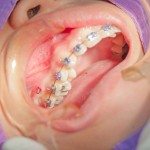
When closing spaces as part of orthodontic treatment using sliding mechanics (frictional mechanics) as opposed to closing loops (frictionless mechanics) teeth are either retracted in two steps (canines followed by incisors) or by en masse retraction of the whole anterior segment simultaneously. The two-step approach is claimed to place less stress on the anchorage but is seen as more complex and time-consuming.
The aim of this review was to compare en masse retraction and two-step retraction for orthodontic space closure.
Methods
Searches were conducted in the Medline/PubMed, Scopus, Web of Science, and the Cochrane Central Register of Controlled Trials (CENTRAL) databases.
Randomised controlled trials (RCTs) and prospective controlled clinical trials (CCTs) published in English were considered. Two reviewers independently abstracted data and assessed risk of bias. The Cochrane risk of bias tool was used for RCTs and the Newcastle-Ottawa Scale for non-randomised studies.
Results
- 8 studies (4 RCTs; 4 CCTs) involving a total of 334 patients were included.
- 2 RCTs were considered to be at low risk of bias and 2 at high risk of bias.
- 3 CCTs were considered to be high quality and 1 of low quality
- 4 studies contributed to a meta-analysis
- There was a statistically significant difference in favour of en masse/miniscrew combination for
- Anchorage preservation Std.Mean Difference (SMD) = − 2.55 mm (95%CI; − 2.99 to − 2.11
- Upper incisor retraction SMD = − 0.38 mm (95%CI; − 0.70 to − 0.06).
- Narrative synthesis suggests that en masse retraction requires less time than two-step retraction with no difference in the amount of root resorption.
Conclusions
The authors concluded: –
Both en masse and two-step retraction methods are effective during the space closure phase. The en masse/miniscrew combination is superior to the two-step/conventional anchorage combination with regard to anchorage preservation and amount of retraction. Limited evidence suggests that anchorage reinforcement with a headgear produces similar results with both retraction methods. Limited evidence also suggests that en masse retraction may require less time and that no significant differences exist in the amount of root resorption between the two methods.
Comments
The authors have searched a number of databases although by limiting the review to English language papers raised the possibility that relevant papers may have been excluded. The number of available studies was small and while risk of bias has been assessed the overall quality of the findings using and approach such as GRADE has not been conducted.
As the authors highlight a majority of the studies did not report significant differences in retraction and although the meta-analysis did find a significant difference the amount of difference between the two groups of − 0.38 mm is not considered to be clinically important. Given the small difference between the two approaches and the limited number of small studies available it id likely that additional studied may change the findings so further high quality studies with larger sample sizes are needed.
Links
Primary Paper
Rizk MZ, Mohammed H, Ismael O, Bearn DR. Effectiveness of en masse versus two-step retraction: a systematic review and meta-analysis. Prog Orthod. 2018 Jan5;18(1):41. doi: 10.1186/s40510-017-0196-7. Review. PubMed PMID: 29302879.

[…] post Orthodontic space closure – en masse or two-step retraction appeared first on National Elf […]